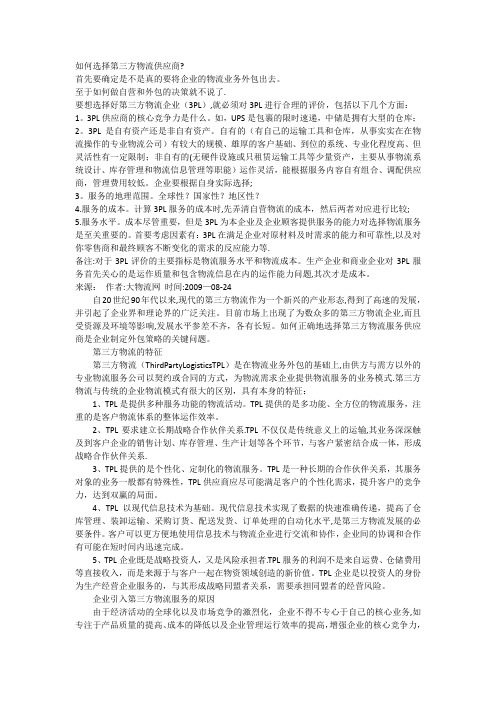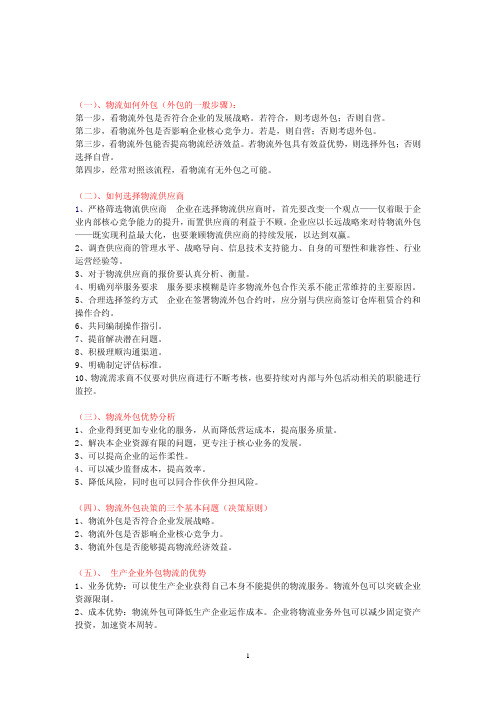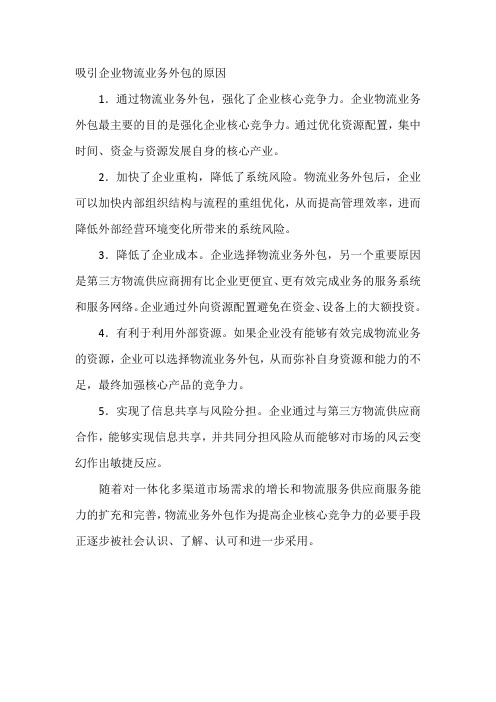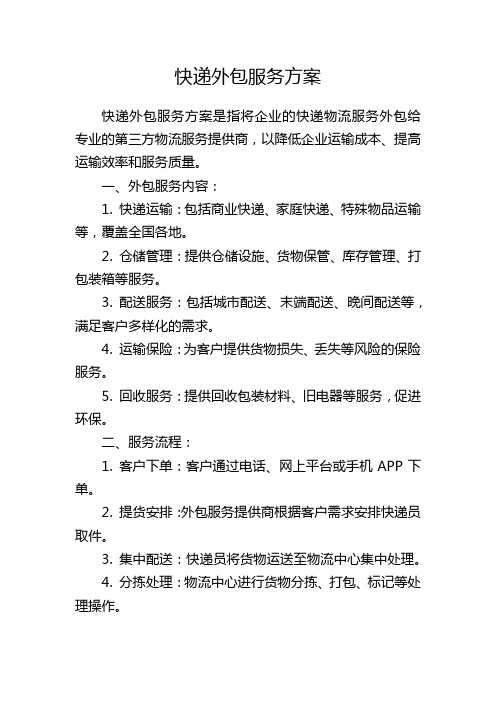物流外包选择因素
物流外包的主要原因

物流外包的主要原因
(一)、降低成本
与企业自营物流相比,许多第三方物流服务供应商在办内外都拥有良好的运输和分销网络,在组织企业的物流活动方面更有经验,更专业化。
所以通过物流业务外包,企业可以降低因拥有运输设备,仓库和其它物流设施所必需的投资,从而把更多的资金投在公司的核心业务上。
(二)、提升企业效率
在企业资源有限的情况下,把企业的物流业务外包给专门的物流管理部门来承担,特别是一些特殊的物流运输业务。
通过外包给第三方物流服务的供应商,企业能够把时间和精力放在自己的核心业务上,提高了供应链管理和企业运作的效率。
(三)、分担企业风险,提高企业的柔性
企业通过外向资源配置,取消了企业与用户双方各自独立拥有的库存和运输,从而分散了由政府、市场、财务等因素产生的风险,促进了资源的优化组合,增加了供应链的柔性,使企业更能适应外部环境的变化。
(四)、快速响应客户需求
现在企业之间的竞争主要在于时间和速度上的竞争,第三方物流服务供应商由于其专业化和规模效应的优势,能够快速地对客户的需求进行回应。
如何选择第三方物流供应商?

如何选择第三方物流供应商?首先要确定是不是真的要将企业的物流业务外包出去。
至于如何做自营和外包的决策就不说了.要想选择好第三方物流企业(3PL),就必须对3PL进行合理的评价,包括以下几个方面:1。
3PL供应商的核心竞争力是什么。
如,UPS是包裹的限时速递,中储是拥有大型的仓库;2。
3PL是自有资产还是非自有资产。
自有的(有自己的运输工具和仓库,从事实实在在物流操作的专业物流公司)有较大的规模、雄厚的客户基础、到位的系统、专业化程度高、但灵活性有一定限制;非自有的(无硬件设施或只租赁运输工具等少量资产,主要从事物流系统设计、库存管理和物流信息管理等职能)运作灵活,能根据服务内容自有组合、调配供应商,管理费用较低。
企业要根据自身实际选择;3。
服务的地理范围。
全球性?国家性?地区性?4.服务的成本。
计算3PL服务的成本时,先弄清自营物流的成本,然后两者对应进行比较;5.服务水平。
成本尽管重要,但是3PL为本企业及企业顾客提供服务的能力对选择物流服务是至关重要的。
首要考虑因素有:3PL在满足企业对原材料及时需求的能力和可靠性,以及对你零售商和最终顾客不断变化的需求的反应能力等.备注:对于3PL评价的主要指标是物流服务水平和物流成本。
生产企业和商业企业对3PL服务首先关心的是运作质量和包含物流信息在内的运作能力问题,其次才是成本。
来源:作者:大物流网时间:2009—08-24自20世纪90年代以来,现代的第三方物流作为一个新兴的产业形态,得到了高速的发展,并引起了企业界和理论界的广泛关注。
目前市场上出现了为数众多的第三方物流企业,而且受资源及环境等影响,发展水平参差不齐,各有长短。
如何正确地选择第三方物流服务供应商是企业制定外包策略的关键问题。
第三方物流的特征第三方物流(ThirdPartyLogisticsTPL)是在物流业务外包的基础上,由供方与需方以外的专业物流服务公司以契约或合同的方式,为物流需求企业提供物流服务的业务模式.第三方物流与传统的企业物流模式有很大的区别,具有本身的特征:1、TPL是提供多种服务功能的物流活动。
物流外包、自营案例分析要点

物流外包、自营案例分析要点(一)、物流如何外包(外包的一般步骤):第一步,看物流外包是否符合企业的发展战略。
若符合,则考虑外包;否则自营。
第二步,看物流外包是否影响企业核心竞争力。
若是,则自营;否则考虑外包。
第三步,看物流外包能否提高物流经济效益。
若物流外包具有效益优势,则选择外包;否则选择自营。
第四步,经常对照该流程,看物流有无外包之可能。
(二)、如何选择物流供应商1、严格筛选物流供应商 企业在选择物流供应商时,首先要改变一个观点——仅着眼于企业内部核心竞争能力的提升,而置供应商的利益于不顾。
企业应以长远战略来对待物流外包——既实现利益最大化,也要兼顾物流供应商的持续发展,以达到双赢。
2、调查供应商的管理水平、战略导向、信息技术支持能力、自身的可塑性和兼容性、行业运营经验等。
3、对于物流供应商的报价要认真分析、衡量。
4、明确列举服务要求 服务要求模糊是许多物流外包合作关系不能正常维持的主要原因。
5、合理选择签约方式 企业在签署物流外包合约时,应分别与供应商签订仓库租赁合约和操作合约。
6、共同编制操作指引。
7、提前解决潜在问题。
8、积极理顺沟通渠道。
9、明确制定评估标准。
10、物流需求商不仅要对供应商进行不断考核,也要持续对内部与外包活动相关的职能进行监控。
(三)、物流外包优势分析1、企业得到更加专业化的服务,从而降低营运成本,提高服务质量。
2、解决本企业资源有限的问题,更专注于核心业务的发展。
3、可以提高企业的运作柔性。
4、可以减少监督成本,提高效率。
5、降低风险,同时也可以同合作伙伴分担风险。
(四)、物流外包决策的三个基本问题(决策原则)1、物流外包是否符合企业发展战略。
2、物流外包是否影响企业核心竞争力。
3、物流外包是否能够提高物流经济效益。
(五)、 生产企业外包物流的优势1、业务优势:可以使生产企业获得自己本身不能提供的物流服务。
物流外包可以突破企业资源限制。
2、成本优势:物流外包可降低生产企业运作成本。
物流外包

2、物流运作效率。第三方物流运作的作 业效率是企业关注的问题之一。很多企业希望减 少仓库的面积甚至达到零库存,这样就对第三方 物流企业进行运输和配送提出较高的要求。如果 经常性的无法及时送货,企业将无法进行正常的 生产和销售,进而影响企业的声誉。单据的准确 率和货物的完好率也将影响企业的产品质量,没 有良好的运输、配送和仓储物流服务,企业将无 法正常运作。因此,第三方物流服务商的作业效 率也是企业进行外包选择的一个最重要的因素, 具体指标包括:物流运作准确率、物流运作完好率、 物流运作速度。
企业需要一个完整有效的物流外包服 务商选择指标体系来对各个物流服务商进 行选择,通过认真、详细的评价工作,找 出满足企业要求的最优物流外包服务商。 综上所述,我们构建的物流外包服务商选 择指标体系主要包括物流成本指标、物流 运作效率指标、服务商基本素质指标和技
术水平指标。
(1)运输成本:主要包括运输设施工具、运输 人员、运输耗能等在运输活动过程中发生的各项 成本。由于运输费用在全部物流费用中占很大比 例,通常占物流总成本的40%以上,因此,运输 费用的减低,对物流需求企业而言是运输合理化 的一个重要目标。运输费用往往成为各种合理化 措施实施是否行之有效的最终判断依据。 (2)仓储成本:主要包括一次采购费用及库存持 有成本。一次采购费用是第三方物流企业在采购 商品时每次所固定支出的费用,库存持有成本主 要由投资于仓库的固定资产及保管费用等构成。
被绿色吹过の春天
一 次
绿
初
色
的
春
旅 行
The End
ቤተ መጻሕፍቲ ባይዱ
带上相机 记录那些可爱的画面
企业在选择物流运作 模式时,一般有三种 选择:自营物流、协作 物流或物流外包。
1、企业对物流控制力的要求。市场竞争不 是很激烈的行业,如果企业对物流活动控制的需 要程度较低,企业会选择物流外包,从而将精力 集中在主营业务上,强化企业的核心竞争力。 2、企业的规模和实力。 3、物流成本和效率。如果企业选择物流外包 的总成本小于企业自营的成本,企业会选择物流 外包。同时,效率也是企业选择物流模式的重要 因素之一 。 4、物流外包服务商的客户服务能力。第三方 物流服务商的服务能力越强,企业就会倾向于物
吸引企业物流业务外包的原因

吸引企业物流业务外包的原因
1.通过物流业务外包,强化了企业核心竞争力。
企业物流业务外包最主要的目的是强化企业核心竞争力。
通过优化资源配置,集中时间、资金与资源发展自身的核心产业。
2.加快了企业重构,降低了系统风险。
物流业务外包后,企业可以加快内部组织结构与流程的重组优化,从而提高管理效率,进而降低外部经营环境变化所带来的系统风险。
3.降低了企业成本。
企业选择物流业务外包,另一个重要原因是第三方物流供应商拥有比企业更便宜、更有效完成业务的服务系统和服务网络。
企业通过外向资源配置避免在资金、设备上的大额投资。
4.有利于利用外部资源。
如果企业没有能够有效完成物流业务的资源,企业可以选择物流业务外包,从而弥补自身资源和能力的不足,最终加强核心产品的竞争力。
5.实现了信息共享与风险分担。
企业通过与第三方物流供应商合作,能够实现信息共享,并共同分担风险从而能够对市场的风云变幻作出敏捷反应。
随着对一体化多渠道市场需求的增长和物流服务供应商服务能力的扩充和完善,物流业务外包作为提高企业核心竞争力的必要手段正逐步被社会认识、了解、认可和进一步采用。
快递外包服务方案

快递外包服务方案快递外包服务方案是指将企业的快递物流服务外包给专业的第三方物流服务提供商,以降低企业运输成本、提高运输效率和服务质量。
一、外包服务内容:1. 快递运输:包括商业快递、家庭快递、特殊物品运输等,覆盖全国各地。
2. 仓储管理:提供仓储设施、货物保管、库存管理、打包装箱等服务。
3. 配送服务:包括城市配送、末端配送、晚间配送等,满足客户多样化的需求。
4. 运输保险:为客户提供货物损失、丢失等风险的保险服务。
5. 回收服务:提供回收包装材料、旧电器等服务,促进环保。
二、服务流程:1. 客户下单:客户通过电话、网上平台或手机APP下单。
2. 提货安排:外包服务提供商根据客户需求安排快递员取件。
3. 集中配送:快递员将货物运送至物流中心集中处理。
4. 分拣处理:物流中心进行货物分拣、打包、标记等处理操作。
5. 运输配送:将货物交付给合作的运输公司进行运输配送。
6. 仓储服务:对于需要仓储的货物,提供仓库管理、库存管理等服务。
7. 末端配送:将货物送达客户指定的末端地点。
8. 客户签收:客户签收货物,并确认收货完成。
三、外包服务优势:1. 成本控制:外包服务可以降低企业的运输成本,通过专业的物流管理、规模效益等手段实现成本控制。
2. 专业服务:外包服务提供商拥有丰富的物流经验和专业的运营团队,能够提供优质的物流服务。
3. 灵活应变:外包服务提供商可以根据客户需求灵活调整运输和配送方案,满足不同客户的特殊需求。
4. 提升效率:外包服务可以通过优化运输路线、提供即时信息跟踪等方式提高运输效率。
5. 服务质量:外包服务提供商通过规范的服务流程、科学的管理和精细化的操作,提高服务质量和客户满意度。
四、安全保障:1. 车辆安全:配备安全设施,定期维护车辆,避免交通事故和货物损坏。
2. 人员安全:快递员经过严格筛选、培训,保证护送货物的人员的安全可靠。
3. 货物保险:为货物投保运输险,确保货物在运输过程中的损失和风险得到补偿。
物流外包决策分析
物流外包决策分析随着全球化和市场化的加快,结构变革也引起了企业对物流外包的关注。
许多企业将物流外包视为提高效率和降低成本的重要手段。
本论文拟从物流外包决策分析的角度,探讨它的概念、决策过程、影响因素和解决方案,从而为企业实际操作提供参考。
一、物流外包的概念物流外包是指将企业内部的物流业务委托给专业的物流服务提供商(第三方物流,3PL)来实现目标的一种策略。
它是企业为了适应市场竞争,提高物流效率和降低成本而采取的一种较为成熟的方式。
二、决策过程1. 决策目标的确定这个阶段的任务是明确企业存在哪些需要解决的问题,为什么需要物流外包。
以提高效率、降低成本、改善服务等方向为目标。
2. 外包决策权的分权企业应针对自身情况,在内部寻找负责人提出物流外包建议,并处理所需程序。
3. 物流外包需求的收集和分析企业应对三方、服务内容、服务质量、价格及合作期限等内容进行调查。
4. 合作伙伴的选择根据企业收集、分析到的数据,进行对比,选择最佳的外包合作伙伴。
5. 合同的制定制定合作协议和合同,明确外包服务的内容、质量标准、支付方式和服务期限等信息。
6. 合作关系的建立尽量减少因沟通、信息不对称等问题造成的合作关系中断,密切合作。
三、影响因素1. 客户需求客户需求是物流外包成立的必要条件。
企业必须了解客户的需求,满足客户的需求,打造吸引力极品物流外包,并以此保证物流外包的价值。
2. 外在环境外在环境是物流外包过程中不可控的因素,它包括、法律、社会文化、经济环境、市场竞争等。
这些因素会制约企业的物流外包决策,影响企业物流外包的效果。
3. 内在因素企业内部的因素就是企业自身的情况,如企业文化、组织结构、信息技术、物流水平等。
这些因素对物流外包决策的影响较为直接,也反映了企业物流外包的主要瓶颈。
四、解决方案1. 选择合适的合作伙伴在选择合作伙伴方面,企业可以从多个角度着手。
首先,应综合考虑伙伴的服务、专业程度、成本、信誉、有效时间和企业内容等方面。
企业物流外包的决策分析及风险防范
企业物流外包的决策分析及风险防范随着全球化的快速发展和市场竞争的加剧,企业对于提高物流效率和降低成本的需求越来越迫切。
为了满足企业的需求,物流外包成为一种常见的解决方案。
企业物流外包可以将专业的物流服务交给专业的第三方物流公司,从而减轻企业自身的压力,并能够更加专注于核心业务。
然而,企业物流外包也存在一定的风险,因此在做出决策之前需要进行综合的分析,并采取风险防范措施。
在进行企业物流外包决策的时候,以下几个方面需要综合考虑:1.成本效益分析:企业物流外包的一个重要目的是降低成本。
需要比较企业自身进行物流管理和选择外包物流服务的成本差异,包括人力成本、设备投资成本和管理成本等。
同时还需考虑外包物流公司是否能够提供更高效的物流服务,以降低仓储、运输和货运等方面的成本。
2.服务质量评估:企业物流外包的另一个关键因素是服务质量。
需要评估外包物流公司的专业能力、运作效率和服务水平等。
可以通过参观物流设施、了解公司的资质认证和客户评价等方式进行评估。
3.风险分析:物流外包也存在一定的风险,需要对可能出现的风险进行全面的考虑和防范。
例如,外包物流公司可能会在执行合同中出现违约行为,导致物流延迟或货物损失等问题。
此外,外包物流公司可能会泄露商业机密或客户信息,给企业带来重大损失。
因此在选择外包物流公司时,需要建立完善的合同机制,并进行定期的监督和评估。
4.供应链可控性:企业物流外包也可能对供应链的可控性产生影响。
外包物流公司可能无法满足企业的特殊要求或发生突发事件时,可能导致供应链中断或运作不畅。
因此在选择外包物流公司时,需要评估其灵活性和适应能力,确保能够满足企业的需求。
为了降低企业物流外包的风险,可以采取以下的风险防范措施:1.建立合作伙伴关系:与外包物流公司建立长期的合作伙伴关系,通过共同成长和深入合作来增强互信和合作意识,减少合作中的不确定性。
2.建立完善的合同机制:合同是企业与外包物流公司之间的重要法律依据,应明确双方的权责义务,确保服务质量、物流安全和数据保密等方面的要求。
企业物流外包策略的选择
本 文 讨 论 的 重 点 是 企 业 外 包 策略 的选 择 , 首 先 分析 企 业在 物 流 外 包和 自营 上 的 选择 ,接 着 进 一 步展 开 论 述 物 流 外 包 方 式 的选 择 ; 然 后 分 析 企业 如 何
选择 物流服 务供应 , 最后 , 站在 信息时
代 的 背 景 下 ,进 一 步 思 考 和 研 究 企 业 物 流 外 包 策略 的 选 择 。
【 关键词】
物流外 包;第三方物流;核 心竞争力;
外 包策略
一
.
前 言
处在 2 世 纪 的今 天 , 关物 流 业 的研 l 有 究在 我 国 已经 广 泛 开展 起来 ,并 取 得 了一 系列 重 要 成 果 。企 业物 流 ,作 为 物 流 业 的 主体越来越受到各界的重视 ,企业物流业 务 外包 的决 策 方 案 一直 是 关注 的重 点 。 随 着 专业 物 流 经 营理 论 的 成型 ,企 业 物 流 外 包 己经 成 为研 讨 的 热点 问题 之 一 , 已经 有 越来越多的企业将 自己的物流业务委托给 第 三 方 物 流 公 司来 完成 。但 是 ,如 何 定性 地 确 定 企 业 物 流 外 包 的条 件 ,如 何 定 量地 选择第三方物流企 业来帮助 自己完成企 业 的物流服务 ,物流外包过程 中委托一 代理 双方之间的风险等等物流业务外包的策略 问题 ,无 论是 从 理 论 还 是 实 际工 作 中都 值 得 探 讨 研 究 。 本 文 不再 研 究 企 业 物 流 外包 的理论模型 ,也不再分析我国物流企业外 包 的现 状 ,直接 深 入 探 讨企 业物 流 外包 策 略 的选 择 。 企业在物流外包的过程 中,不仅要考 虑 企 业 自身的 因 素 ,同时 也 需考 虑外 部 环
物流业务外包的成因及形式
物流业务外包的成因及形式
(一)、业务外包的成因
1.强化企业的核心竞争力
外包的目的是为了使企业保持精干,集中精力强化企业的核心能力。
2.利用企业外部资源
企业通过将自己不擅长的业务外包给专业公司完成,可以利用外部资源弥补自己资源和能力的不足
3.降低和控制成本,节约资金
专业公司拥有比本企业更有效、更便宜地完成某业务的技术和知识,因而他们可以获得规模效益,并且愿意通过这种方式获利。
因此,企业可以通过外向资源配置避免在设备、技术、研究开发上投入巨资。
4.分担风险
企业本身的资源、能力是有限的,通过资源外向配置,与外部企业合作,风险共担,企业可以变得更有柔韧性,更能适应变化的外部环境。
二)、业务外包形式
常见的业务外包形式:物流外包、营销外包、研究开发外包、文件服务外包、人力资源管理外包、应收账款外包、信息系统外包等。
- 1、下载文档前请自行甄别文档内容的完整性,平台不提供额外的编辑、内容补充、找答案等附加服务。
- 2、"仅部分预览"的文档,不可在线预览部分如存在完整性等问题,可反馈申请退款(可完整预览的文档不适用该条件!)。
- 3、如文档侵犯您的权益,请联系客服反馈,我们会尽快为您处理(人工客服工作时间:9:00-18:30)。
附件:外文翻译原文Selection Factors in Logistics Outsourcing – A View from Third-party Logistics ProviderCustomersThe beginning of the 21st century is proving to be an interesting time for the logistics industry. There has been a great deal of transformation in logistics outsourcing caused by the continued drive of manufacturers and retailers to cut costs and a continued focus on core competencies.Logistics and supply chain management have often been among the first functions to be outsourced. This has moved beyond the warehousing and trucking functions and spread to ancillary services such as light assembly. However, once a manufacturer or retailer makes the business decision to outsource its logistics function, what are the primary factors that influence its choice of third-party logistics (3PL) provider? Is it price, service, location or technology?To answer this question, the International Warehouse Logistics Association (IWLA), the leading trade association dedicated to logistics outsourcing, commissioned a study in early 2003. The study, conducted by Dr Dale S Rogers, Professor of Logistics at the University of Nevada, Reno, was an update of similar studies conducted in 1994 and 1999. The subjects were the IWLA’s membership of more than 550 logistics companies. The study included follow-up interviews with several customers of 3PL providers.The study discovered a number of interesting trends and changes in the practice of logistics outsourcing, not least of which is the change in factors that customers use when selecting an outsourcing partner.In 1994, the critical factors in the selection process were those related to level and quality of services. Interviewed customers also identified quality and service factors as deciding factors when selecting a logistics provider.Companies were asked to rate the relative importance of several selection factors on a scale of one to seven, with one being unimportant and seven being very important.In 1994, pricing of services was ranked 11th, while service quality ranked first. Most of the other top factors also related to service quality. Reliability ranked second, on-time performance third and good communication fourth. Most of the companies interviewed said that price was not as important as excellent service. In fact, several 3PLs said that customers did not often leave because of price if services were performed competently, although they admitted that price was always a crucial part of the negotiation.In 1999, the study once again found that the top three determinants in selecting a logistics outsourcing partner were service-related; however, price moved up to fourth from 11th. The perception by the 3PL service providers was that service quality continued to be more important than price.By 2003, the shift towards price as the most important selection criterion came full circle. None of the companies interviewed believed that any of the other factors were as important as price of services when their customers were making decisions about which 3PL to do business with.Follow-up interviews found that this change over the past decade is likely to be due to several factors. First, high-quality service is now expected by all customers. It is assumed that the 3PL provider will be able to perform with near flawless execution.Customers are not interested in training a 3PL to serve them. Instead, they are demanding that the provider has management skills, project start-up capabilities and execution abilities that are as good, or better, than the customers themselves.Another key driver in the increased emphasis on price is greater pressure on cutting cost within the customer company. Customers seem to be fixated on cost decreases, even if they do not truly understand the services they are receiving. This is because, 10 years ago, most companies were outsourcing for the first time. Then, as the relationships with 3PLs matured, they became more demanding about the cost of the services. In fact, many customers today assume that the cost of logistics services will continue to decrease while the quality and number of services received continue to increase.An underlying factor in many of the 3PL selection decisions is flexibility and innovation. Customers have come to expect that their service suppliers can do more than just hold inventory or move freight. Many of these customers are focusing on their own core competencies, re-engineering and outsourcing duties that fall outside of those core competencies. This can mean that a service supplier will be asked todevelop diverse capabilities. Several of the companies included in the research identified the willingness to work towards solving customer needs as critical to developing and retaining customers. The ability to handle the detail that customers have difficulty managing creates opportunity for service suppliers. Most companies said that they customize the package of services offered for each and every customer. Clearly, flexibility is important.Another factor in selecting a 3PL related to flexibility and innovation is the interest the provider has in the customer’s business. One 3PL said that they focus on a customer’s interests and concerns, even when that customer cannot articulate what those interests and concerns are. The 3PL must show customers that they are willing to commit resources and time to develop what this survey respondent termed ‘unusual and outrageous service’. This reinforces the theory that many current and potential customers have to be educated before they can purchase base level and extended services intelligently. Areas where the 3PL can improve the customer’s productivity are often not apparent to many customers.In a business where the bulk of marketing is based on the building of relationships, reputation is also critical. Several companies said that they believed their company is often selected because of the strength of the management team and operational employees.Location is another important factor in selection decisions. Customers select distribution points based on market accessibility. However, multi-city operators have emerged that are willing to move a contract operation into a location based on a large customer’s requirements. They then use this new base of operations to leverage additional business development.Another critical decision factor in the selection of 3PL providers is systems expertise and capabilities. Some customers are more interested in the availability of information about the location and condition of their inventory than they are in the inventory itself. Customers also look for systems compatibility with their own information technologies. Service suppliers that can best link with customers have a distinct competitive advantage.The nature of the industry has evolved tremendously over the last 10 years. The successful 3PL of today was probably laying the groundwork for that success in 1994. These innovative companies continue to develop new service capabilities and better managers.The ‘warehousing’ portion of the logistics service business is still significant, but the 3PL of 2003 is expected to be an expert in many other areas. Customer expectations are likely to increase and their close management of costs will also continue to be stressed. Value-added services that relate to the development and movement of information will increase in importance.The Association for Logistics Outsourcing (IWLA) has been a force in North American business since 1891. It has seen many changes in the business of its members over the past 112 years. However, it appears that the rate of change experienced by operators has increased most dramatically in the past 10 years. If this rate of change continues, it seems likely that the successful logistics service provider of 2010 will be substantially different from the 3PL of 2003.。
